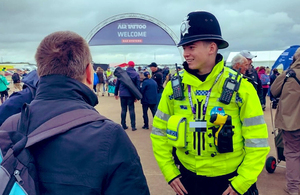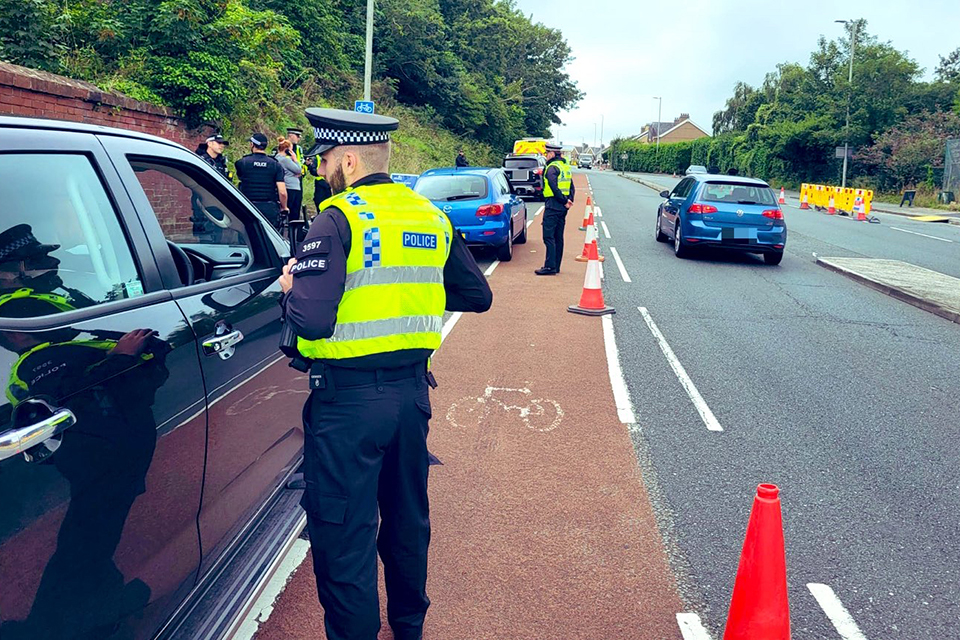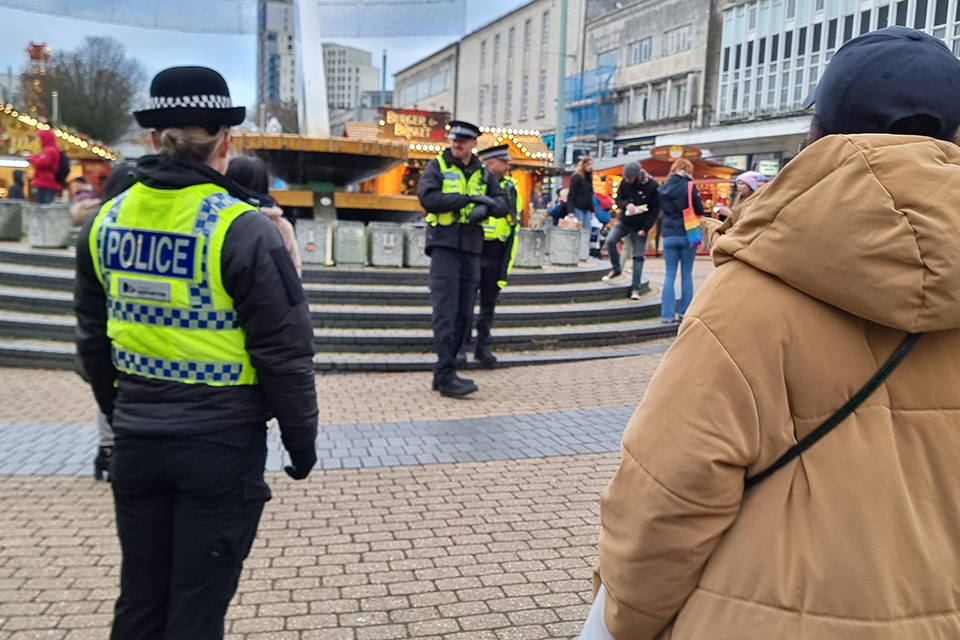MDP celebrates six years of Project Servator
This year the Ministry of Defence Police celebrated their six-year anniversary of deploying Project Servator.

A Project Servator officer talking to a member of the public at the Royal International Air Tattoo. Copyright: Ministry of Defence Police.
Following its initial launch in 2017, Project Servator remains a vital policing and counter-terrorism tactic for the Ministry of Defence Police (MDP).
There are now a high number of trained Project Servator officers in the MDP deployed at a range of locations across the UK, including the Atomic Weapons Establishment (AWE) sites in Berkshire, Defence HQ in Whitehall and the naval ports in Clyde, Devonport, and Portsmouth, where it was first trialled in 2016.
Project Servator officers can also be seen in the wider communities surrounding the sites that the MDP protects, supporting MDP and national policing operations. These include local transport hubs, shopping centres and tourist hotspots.
Over the years, their deployments have included the Royal International Air Tattoo (RIAT), G7, First Entries and commissioning ceremonies of the Queen Elizabeth Class Aircraft Carriers, and more recently The King’s coronation.
At a special event held at MDP headquarters in Cambridgeshire earlier this year, Project Servator officers gathered to mark their six-year anniversary of deploying this national policing tactic.
The event was hosted by the MDP Project Servator Strategic Lead and commanding officers, and included a presentation from the Fixated Threat Assessment Centre (FTAC), one of MDP’s many working partners while deploying Project Servator.
What is Project Servator?
Project Servator was first developed and introduced by the Centre for the Protection of National Infrastructure (CPNI) - now known as the National Protective Security Authority (NPSA) - and the City of London Police in 2014, and it is now used by a number of police forces in the UK as well as Royal Gibraltar Police.
It is a policing tactic designed to disrupt a range of criminal activity, including terrorism, while providing a reassuring presence for the public.
Servator is a Latin word which means ‘watcher’ or ‘observer’, and whilst this is an accurate descriptor of a Project Servator officer, it merely touches the surface of what happens during these policing operations. Project Servator officers, in uniform and plain clothes, are not just ‘watching’ and ‘observing’, but have been specially trained to spot the tell-tale signs of terrorist and other criminal activity.
Although the primary aim of Project Servator is to assist in the fight against terrorism, it has also proved to be an effective tool for detecting other criminal activity, including drug-related crime, and driving and vehicle offences.

A Project Servator vehicle checkpoint nearby HM Naval Base Devonport. Copyright: Ministry of Defence Police.
Each deployment is different. They are unpredictable but highly visible, and can pop up anywhere, at any time.
You will see varying numbers of specially trained uniformed police officers who are supported by other police resources, including firearms officers, Licensed Search Officers and police dogs.
You may also see deployments supported by other security measures, such as vehicle checks and Automatic Number Plate Recognition (ANPR), as well as those that are less visible; including plain clothes officers and CCTV.

A police dog, and their handler, supporting a Project Servator deployment. Copyright: Ministry of Defence Police.
How does it work?
Project Servator is founded on a joined-up approach which involves the police and public working together to tackle criminality and terrorism.
It relies on a network of vigilance, and extra eyes and ears to look out for suspicious activity, and to disrupt those intent on committing crime.
MDP Project Servator teams therefore work closely with security and policing partners, sharing information and intelligence, and taking part in joint Project Servator deployments.
Officers also engage with site security; people who work at and visit the sites we protect; those living in and travelling around the surrounding areas, and local businesses. You will see posters on display boards and officers handing out leaflets explaining more about Project Servator.
If you see our Project Servator officers in the workplace or out in the community where you live, work or are visiting, there’s nothing to be concerned about. It is normal police activity. If you have any questions, please feel free to talk to our officers.

Project Servator engaging with members of the public. Copyright: Ministry of Defence Police.
Chief Inspector Jeff Renton has been part of Project Servator since its launch 6 years ago. He managed the Project Servator team based at Defence HQ in Whitehall from its inception in 2018. He said:
Since 2017, our Project Servator teams have worked hard to build a strong network of vigilance and promote a security-minded culture in and around the sites we protect.
Over the last six years, we have seen an increase in arrests for theft, possession of offensive weapons, and drugs, traffic and immigration offences, along with an increase in intelligence gathering.
This is a direct result of our Project Servator officers working together with our policing and security partners, local employers and business and the public, to make it difficult for criminals to succeed.
A joined-up approach of partnership working and community engagement will always be one of the best tactics against criminality and terrorism.
The work our teams have done has helped strengthen the national counter-terrorism focus, and improve vigilance. This saw us win a ‘Highly Commended’ Team Award at the Government Security Conference Awards in 2020.
We have come so far, but there is still much more to do. The threat of terrorism is unlikely to ever go away. In the coming years, we are looking to grow the teams so we can reach out to more people and spread the Project Servator message.
Protecting Defence and the communities we serve is our top priority, by working together with those inside and outside the wire, we can all help to keep each other safe: together, we’ve got it covered.

Project Servator at a Christmas market. Copyright: Ministry of Defence Police.
Staying safe at Christmas
Project Servator deployments are being stepped up during the festive season and New Year period. Consequently, there will be an increased police presence in and around the sites policed by MDP, as well as nearby locations such as Christmas markets and other local festive events, where MDP will be supporting their policing and security partners.
Christmas and New Year are particularly busy times, with more people out enjoying the celebrations. Project Servator deployments are highly visible, but there is nothing to be concerned about if you see one in your area – it is normal police activity, and isn’t linked to any specific threat. The officers are simply there to keep you and defence safe.
Officers will be talking to the public and local business to let them know what they are doing and remind them to be vigilant, trust their instincts and report any suspicious or unusual behaviour.

Project Servator keeping you safe at Christmas poster. Copyright: Ministry of Defence Police.
How can you help?
If something doesn’t feel right, trust your instincts, and report it to a police officer, member of security or staff immediately. We’ll do the rest.
Reports can also be made online, in confidence, on the Action Counters Terrorism website.
To report suspicious activity to the MDP, call 0300 790 4103. In an emergency always call 999.
Want to find out more?
For further information about Project Servator visit: Ministry of Defence Police: Project Servator.
You can also follow #ProjectServator on: